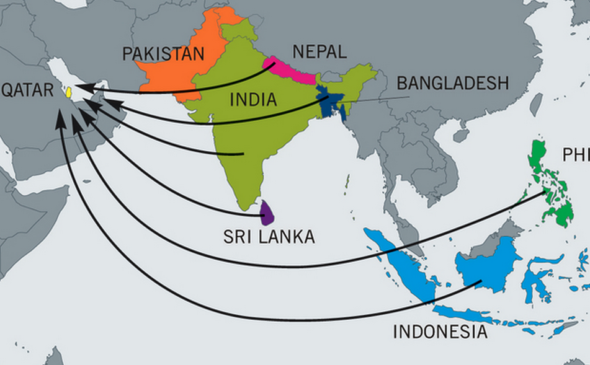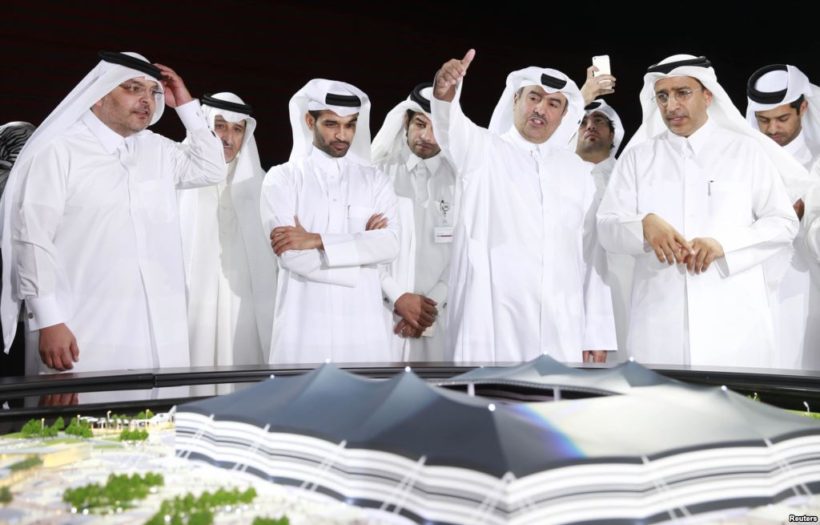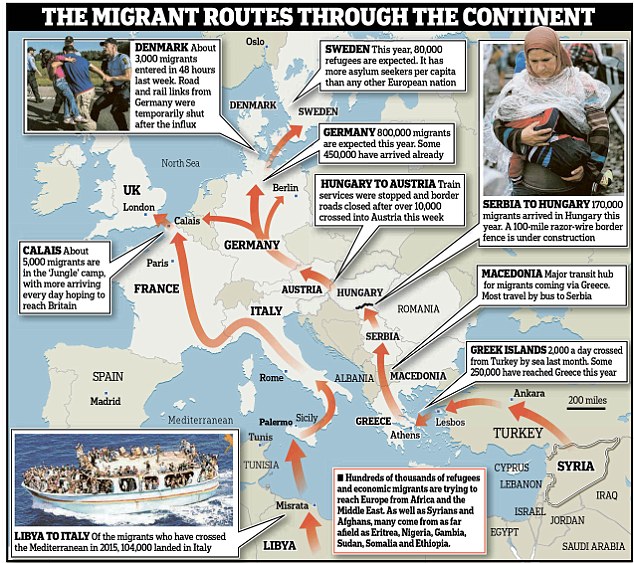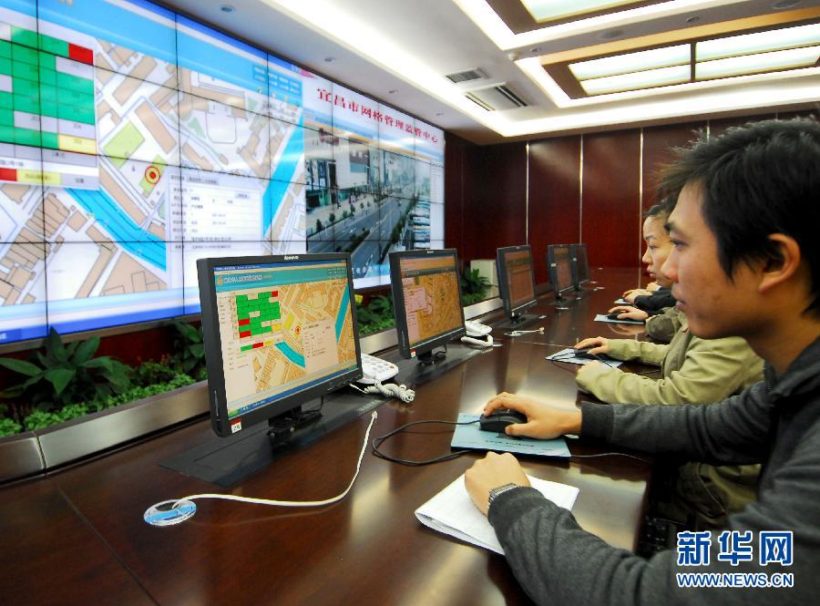News from Qatar, Austria and China
Tuesday's World Events — Posted on April 5, 2016
QATAR – Qatar using forced labor at 2022 World Cup stadium
(France24) – Migrant laborers faced abuse that in some cases amounted to forced labor while working on a stadium that will host soccer matches for the 2022 World Cup in Qatar, a new report released by Amnesty International alleged Thursday.
Rights groups and news organizations have previously raised serious concerns about working conditions in Qatar, but the latest Amnesty report stands out because it links alleged mistreatment directly to work on a World Cup venue (stadium).
The group’s findings will intensify pressure on Qatar to accelerate labor reforms as the tiny and immensely rich Gulf country races to transform itself with sweeping infrastructure projects ahead of the games.
Amnesty compiled the 52-page report based on interviews from February to May last year with 132 construction workers at the Khalifa International Stadium, one of several arenas that will host World Cup matches. The London-based group also interviewed 99 migrants doing landscaping work in a surrounding sports complex that is not directly related to the games, and three other gardeners working elsewhere.
Foreigners account for roughly 90 percent of the 2.5 million people living in Qatar, many of them low-paid migrant workers from South Asia. Most of the workers interviewed in the Amnesty report were from Bangladesh, India and Nepal.

A map showing where the majority of migrant workers are coming from (Image: Amnesty International)
All of those interviewed reported some kind of abuse, including squalid or crowded living quarters, salary payments being withheld for months, and measures including passport confiscation that make it difficult to leave the country. Migrant workers elsewhere in Qatar have reported similar problems in the past.
Many in the Amnesty report said their sponsoring employer failed to obtain or renew their working permits, leaving the workers subject to fines and detention.
Each reported going into debt to pay recruitment fees – illegal under Qatari law – ranging from $500 to $4,300 to secure work. Most discovered on arrival that they would be paid less than promised by recruiters back home. Some of those interviewed reported earning basic salaries of well below $200 a month, plus allowances of around $50 a month for food.

Qatar Secretary-General Hassan Al-Thawadi, of the nation’s 2022 World Cup organizing committee, speaks during a news conference in June 2014. (VOA File photo)
The report’s most damning findings center on what Amnesty says is evidence of forced labor involving workers employed on the refurbishment of the Khalifa stadium, a venue first built in the 1970s that is being overhauled to host World Cup matches.
The forced labor allegations involve workers employed by at least one small labor supply company contracted to provide manpower on the stadium project. The report includes comments from five workers who described being forced to work against their will after trying to leave or refusing to work because of pay disputes.
One worker who told Amnesty he tried to return home because of consistently late pay alleges his boss threatened to withhold his salary and told him to “keep working or you will never leave.” …
…The United Nations’ International Labor Organization earlier this month gave Qatar one year to act on findings by an ILO delegation or face the possibility of a formal “commission of inquiry” by the U.N. labor agency. [Stop or they’ll say stop again.]

Concern over Qatar’s human rights record also extends to FIFA, soccer’s world governing body, as it works to rebuild its scandal-tarnished image. In December, FIFA tapped Harvard professor John Ruggie to draft human rights requirements for World Cup hosts and sponsors. [FIFA is responsible for the organization of the World Cup]
FIFA told the AP it remains “fully aware of the risks facing construction workers in Qatar and of the opportunity that FIFA, together with other stakeholders, has to facilitate the improvement of working conditions in the country.”
It acknowledged that “challenges remain” and said it will continue to urge Qatari authorities and others involved to take steps that ensure that standards put in place by Qatar’s Supreme Committee become the benchmark for construction work in Qatar.
AUSTRIA – Austria closes its borders to almost all asylum-seekers
(London’s Daily Telegraph) – Austria has announced tough new plans to reject almost all asylum-seekers at its borders as it continues a crackdown against migrants.
Under the new measures, all asylum claims will be decided within an hour at the country’s borders.

September 2015 migrant map
Only migrants who have an immediate relative already granted asylum in Austria will be allowed to enter.
Applicants who are at risk of death or inhumane treatment if they are not granted asylum will also be allowed in.
But in practice almost no one will be able to claim asylum on the grounds of physical danger as they will be judged to be safe in the neighboring European countries they have travelled through.
All migrants whose claims are rejected will be turned back at the border.
“We will not accept any applications for asylum unless we are obliged to under criteria such as Article 8 of the European Convention on Human Rights,” Johanna Mikl-Leitner, the Austrian interior minister, said.
Werner Faymann, the Austrian chancellor, indicated the country will no longer allow asylum-seekers to cross its territory on their way to Germany.

If Germany wants to accept asylum-seekers, “they must be picked up from where they are, before they make an illegal journey,” Mr. Faymann said.
The new plans come after a quota system imposed earlier this year by the Austrian government to limit refugee numbers was ruled illegal by its own experts.
In January, the Austrian government announced it would only accept 37,500 asylum-seekers this year. It later moved to impose daily caps. But the European Commission challenged the quota policy as illegal under EU law.
Chancellor Faymman’s government appointed its own panel of experts to examine the policy, but they ruled it was illegal.
Austria has been locked in a dispute with Germany over its efforts to stop the influx of asylum-seekers by sealing borders along the “Balkan Route.”
The numbers of migrants traveling through Europe has fallen dramatically since Austria and other countries moved to close their borders.
But German Chancellor Angela Merkel has accused them of creating a new humanitarian crisis in Greece by confining migrants there.
CHINA – China’s Communist government reverts to ‘grid management’ to monitor citizens’ lives
(The Financial Times) – China is rolling out a nationwide system of social control known as “grid management” in a revival of the Communist government’s state presence in residential life that had receded during recent decades.
…Small police booths and networks of citizens have been set up block by block to reduce neighborhood disputes, enforce sanitation, reduce crime — and keep an eye on anyone deemed a troublemaker.

Grid management center in Yichang, Hubei province.
The rollout coincides with a broader tightening of state control over citizens’ everyday life and crackdown on dissent under President Xi Jinping.
“The grid management system is an attempt by the authorities to re-establish its control over individuals,” said Li Dun, an expert in public management at Tsinghua University in Beijing. “The aim is to reinstate the idea of upholding the party’s leadership.”
An earlier system of Communist government-run neighborhood committees, which monitored every urban citizen, has declined since the mid-1990s as private housing became more common and social controls faded. [Previous to that, Chinese citizens were not permitted to own their own home or to travel without a permit.]
During a recent journalists’ tour of the politically sensitive Tibetan capital of Lhasa, officials credited grid management for the calm and order in the city. The mass troop deployment that followed a 2008 riot was no longer visible, although local residents said the heavy security presence was reinstated during Tibetan holidays or sensitive anniversaries.
As well as small police booths that stud residential blocks in Lhasa, there are police booths at the entrance to villages around the city, as well as much larger checkpoints set up like tollbooths on the roads leading into larger towns.
The system is being introduced relatively late in Guangzhou, the traditionally more freewheeling south. The city plans to hire 12,000 grid administrators so each can be responsible for 200 families. Like many government plans in China, the numbers appear to be based on the population of registered residents, not the migrants who swell into big cities.
“If a grid administrator is responsible for 200 families, he can roughly remember who is in his grid in one month’s time and grasp the basic information of each family in about three months’ time. In six months’ time, he can count every member of those families,” Guangzhou’s mayor, Chen Jianghua, was quoted as saying.
“He will even have a clear idea of the numbers of migrant workers living in his grid and how much they are paying for their rent,” Mr. Chen said. …
(The news briefs above are from wire reports and staff reports posted at France24 and London’s Daily Telegraph on March 31 and The Financial Times on April 3.)
Questions
1. For each of the 3 countries, give the following information:
- capital
- location/the countries that share its borders
- the religious breakdown of the population
- the type of government
- the chief of state (and head of government if different) If monarch or dictator, since what date has he/she ruled? – include name of heir apparent for monarch
- the population
Find the answers at the CIA World FactBook website. For each country, answers can be found under the “Geography” “People” and “Government” headings.
NOTE to students: Before answering the questions below, read the information under “Background.”
2. For QATAR:
a) list the who, what, where and when of the news item
b) How many migrants live in Qatar? Where are they from?
c) What type of problems (bad treatment) do migrants experience in Qatar?
d) Consider the following:
- FIFA awarded Qatar the 2022 World Cup in 2010. Six years later, Qatar has not changed its treatment of migrant workers.
- The Qatari government says it has already made changes to protect workers and it is committed to doing more, calling its reform efforts a "work in progress." It said in a statement that worker welfare is a top priority and it welcomes efforts by Amnesty and others.
- The U.N.’s International Labor Organization has given Qatar one year to act on findings by its delegation or face the possibility of a formal "commission of inquiry" by the U.N. labor agency.
- In December 2015, FIFA hired a Harvard professor to draft human rights requirements for World Cup hosts and sponsors. FIFA told the AP it remains "fully aware of the risks facing construction workers in Qatar and of the opportunity that FIFA, together with other stakeholders, has to facilitate the improvement of working conditions in the country." It acknowledged that "challenges remain" and said it will continue to urge Qatari authorities and others involved to take steps that ensure that standards put in place by Qatar's Supreme Committee become the benchmark for construction work in Qatar.
Should Qatar have first proved that workers were treated fairly before being awarded the 2022 World Cup, or do you think it was better for FIFA to give them the opportunity first and allow them 12 years to ensure fair treatment of workers? Explain your answer.
(CHALLENGE: Read the wikipedia entry linked to under “Resources” below for information on the controversy surrounding FIFA’s awarding Qatar the opportunity to host the 2022 World Cup.)
3. For AUSTRIA:
a) list the who, what, where and when of the news item
b) Which applicants will still be granted asylum? Why will that number be minuscule?
c) What effect has Austria and other countries’ move to close their borders had on the number of migrants traveling through Europe?
d) Austrian Chancellor Faymann said if Germany wants to accept asylum-seekers, “they must be picked up from where they are, before they make an illegal journey.” German Chancellor Angela Merkel has accused Austria of creating a new humanitarian crisis in Greece by confining migrants there. Who do you think is responsible for creating a humanitarian crisis, Angela Merkel for giving migrants the hope that they can travel to Europe and be granted residence, or Austria and other countries who are attempting to protect their own citizens by slowing the flow of migrants from Middle Eastern and African countries? Explain your answer.
e) It has been suggested that the EU and Turkey establish a “safe-zone” over the border in Syria where those in danger can stay until the war is over. Ask a parent which policy he/she thinks makes more sense: the “safe-zone” on the Syrian-Turkish border, or Angela Merkel’s policy of welcoming millions of migrants to Germany as well as requesting all European countries accept many migrants.
4. For CHINA:
a) list the who, what, where and when of the news item
b) What does the implementation of the grid management system coincide with in China?
c) What is the Communist government’s grid management system? Be specific.
d) How does Li Dun of Tsinghua University in Beijing describe the purpose of the grid management system?
Background
QATAR
- Qatar has announced planned changes to its "kafala" employee sponsorship system, which critics say leaves workers open to exploitation and abuse. The system, versions of which are used throughout the oil-rich Gulf states, gives bosses considerable power over workers by effectively binding them to a given employer and, in Qatar's case, forcing them to secure exit permits before they can leave.
- Changes signed into law by Emir Tamim bin Hamad Al Thani last October are designed to make it easier for employees to change jobs or leave. Workers still won't be able to immediately change jobs or depart whenever they want, however, and the changes don't take effect until later this year.
- The government has already made other changes, including moving some laborers into improved accommodations and instituting a "wage protection system" to tighten oversight of salary payments.
- It says it is committed to doing more, calling its reform efforts a "work in progress." It said in a statement Thursday that worker welfare is a top priority and it welcomes efforts by Amnesty and others. ...
- The labor regulations at World Cup sites are meant to be particularly stringent. The Supreme Committee for Delivery and Legacy, which is leading Qatar's development of tournament venues and other projects, requires contractors to adhere to specific worker welfare standards that it and outside auditors monitor. (No mention about protection for workers outside of the World Cup sites.)
- The Supreme Committee acknowledged in a statement to The Associated Press that Amnesty "identified challenges in worker conditions existing during early 2015," but it said many of the issues raised in the report were addressed by June because of its own monitoring and enforcement efforts. It claimed, "The tone of Amnesty International's latest assertions paint a misleading picture and do nothing to contribute to our efforts," it said. "We have always maintained this World Cup will act as a catalyst for change - it will not be built on the back of exploited workers. We wholly reject any notion that Qatar is unfit to host the World Cup." (from the France24 article above)
CHINA
Hukou, a system of residency permits, was used by China's Communist Party beginning in 1958 to minimize the movement of people between rural and urban areas. Chinese citizens were classified as urban and rural based on their hukou; urban residents received state-allocated jobs and access to an array of social services while rural residents were expected to be more self-reliant.
Not surprisingly, the disparity led many rural Chinese to migrate to cities, which in turn led the government to create more barriers to migration. “By law, anyone seeking to move to a place different from where their household was originally registered had to get approval from the hukou authorities,” says Chan, “but approval was rarely granted. In essence, the hukou system functioned as an internal passport system. While old city walls in China had largely been demolished by the late 1950s, the power of the newly created migration barrier is likened to ‘invisible’ city walls.”
The surprise is that the hukou system still exists today despite the stunning changes that have taken place in China over the past few decades. Some migratory controls were lifted in the late 1970s, in response to a demand for cheap labor in urban factories, but the basic structure remains intact. Rural-hukou Chinese who migrate to cities are not eligible for basic urban welfare and social service programs, including public education. To receive an education beyond middle school, they must return to their home village, despite a lack of funding for schools in the countryside and a bias against admitting students from rural schools to Chinese universities. (from washington.edu)
